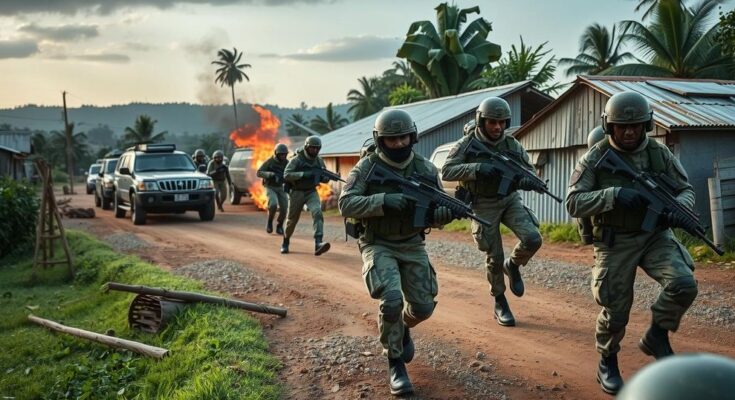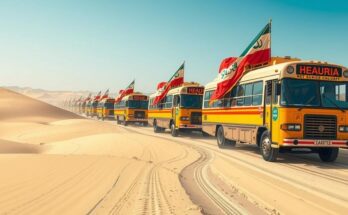Rwanda-backed M23 rebels have captured Masisi in eastern DR Congo, marking significant territorial gains after they took control of Katale recently. This escalation has resulted in a deepening humanitarian crisis, as authorities struggle to respond. The conflict, intertwined with regional politics and mineral exploitation allegations, continues to pose challenges for government stability and civilian safety.
Rebel forces aligned with Rwanda have successfully captured the town of Masisi in the eastern Democratic Republic of Congo (DRC), following their recent takeover of Katale the previous day. This marks the second significant territorial gain for the M23 group within North Kivu province in just two days. The M23 has expanded its control in eastern DRC since 2021, leading to widespread displacement of civilians. In light of recent events, North Kivu provincial assembly member Alexis Bahunga expressed his concern, describing the situation as a deepening humanitarian crisis. Residents reported that the M23 held a meeting proclaiming their intent to ‘liberate the country.’ Notably, the Congolese government has yet to issue a formal statement regarding the loss of Masisi, a town boasting a population of approximately 40,000 and situated 80 kilometers north of the provincial capital, Goma.
The backdrop of this conflict reveals a long-standing discord in eastern DRC, where the M23, initially formed as a protector of the Tutsi community facing discrimination, has evolved into a force frequently accused of exploiting the region’s mineral wealth for its own gain. With Rwanda alleged to have deployed around 4,000 troops to support the M23, tensions remain high, particularly after mediation efforts led by Angola collapsed last month. Rwanda justifies its actions by claiming that the Congolese government has failed to address ongoing conflicts, alleging associations between the DRC authorities and individuals responsible for the 1994 genocide against ethnic Tutsis. Amid the turbulence, legal actions regarding the exploitative practices surrounding so-called “blood minerals” have gained momentum, as highlighted by DRC’s recent lawsuit against Apple for its role in this ongoing issue.
The conflict in the eastern Democratic Republic of Congo is rooted in complex historical, ethnic, and geopolitical factors. The M23 rebel group, which arose in 2012 as a continuation of earlier conflicts, claims to protect the Tutsi community, which has faced various forms of persecution. The region is rich in valuable minerals, making it a focal point for both local and foreign interests. Rwanda’s involvement is often scrutinized, with accusations that it aims to exploit these resources while manipulating the regional power dynamics. The humanitarian impact of the conflict is profound, with significant population displacements and pressing humanitarian needs arising as a result of ongoing violence. As external mediations falter, the prospects for peace and stability remain uncertain.
The recent seizure of Masisi by Rwanda-backed rebels underscores the escalating tension and humanitarian crisis in the eastern Democratic Republic of Congo. The M23 group’s advancements highlight both the complexities of local conflicts and the larger geopolitical maneuvers at play. With significant international concerns regarding the exploitation of the region’s resources and ongoing humanitarian distress, a renewed focus on equitable solutions and effective governance is essential to achieving lasting peace.
Original Source: www.bbc.co.uk




